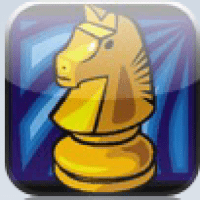The
Opening Pro app ($1.99 from Gaussian Knights -
view in iTunes) is not the only iPhone chess app to provide guidance through the theoretical thicket of chess openings (see below), but it might be the only one whose
primary purpose is about openings. As such, its user interface provides a more robust set of features for finding, selecting, managing and reviewing your favourite openings than anything else in the Store today.
The app provides the opening moves for more than 1700 book openings - all of which are categorized in the search/selection menus by ECO code and opening name (often including moves in algebraic notation). You can either drill down through "Opening Systems" (for example,
[B34 - B39] 1. e4 c5: Sicilian Defense Accelerated Dragon) to get to the individual opening you want to explore - or you can search directly by opening name or variation name (including any chess notation that may be included in the name).

Once you've selected an opening, you can quiz yourself by playing through the game, making moves for either white or black. Once the opening moves are complete, you are alerted; at this point, you can keep playing against the built-in AI, which iPhone chess enthusiasts will be happy to know is none other than Tord Romstad's excellent 'Glaurung' engine.
Conveniently, the app remembers the openings you've reviewed recently and allows you to maintain a list of your own favourite openings; both of these lists can be accessed easily without performing a new search.
Again, the focus here is very much on openings practice. As an iPhone chess opponent, the app is relatively "bare-bones" from a features standpoint. The UI is not configurable, and your control over the engine is limited to a single setting to determine whether Glaurung takes 1, 2, 5, 10 or 30 seconds for each of its moves. The lack of 'handicap' settings makes sense in the context of the app's main purpose; after all, why hone your openings only to the point where you can achieve early middle-game equality (or better) against a dumbed-down opponent?
What strikes me as a bigger and more relevant gap is that, in the current version, you
cannot display the engine's analysis. Having a visible evaluation from Glaurung on moves made after going out of book would really add a
lot of value here. (Pretty please...)
[Edit (Dec 16): Already added! See comments.] In any case, $2 isn't too bad for a Glaurung-based openings-book trainer. I'm going to try picking all my repertoire openings as favourites, and I'm already looking forward to future updates.
Here are a few notes on how
Opening Pro compares to two other apps that provide openings assistance:
Opening Pro# of opening moves in book: Unknown. "Over 1700 openings in total!" according to publisherPros:
- Price
- ECO catalog or text-based searching
- Maintains recent openings and user favourites
Cons:
- Other chess features are simplistic or non-existent
- No engine analysis option once out of book
 tChess Pro# of opening moves in book: Approx. 15 000Pros:
tChess Pro# of opening moves in book: Approx. 15 000Pros:
- Openings Library allows opening to be selected before game
- Shows multiple opening book move-options per position, with percentages from 125000 GM games
Cons:
Hiarcs # of opening moves in book: "1.2 million positions and moves"Pros:
# of opening moves in book: "1.2 million positions and moves"Pros:
- Deepest opening book on the platform
- Integrates view of book moves on main screen
- Includes notation ("!", "?", etc.) to indicate Hiarcs's book evaluation of the moves
Cons:
- Cannot pre-select an opening (although you can enter the appropriate moves manually for both sides and then activate the AI at any point you wish)
- Opening name is shown only when first non-book move is played
Cheers!








